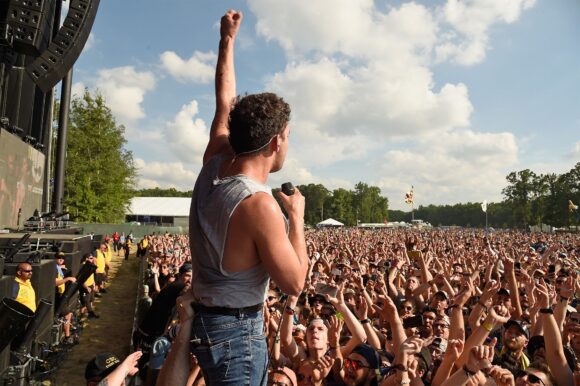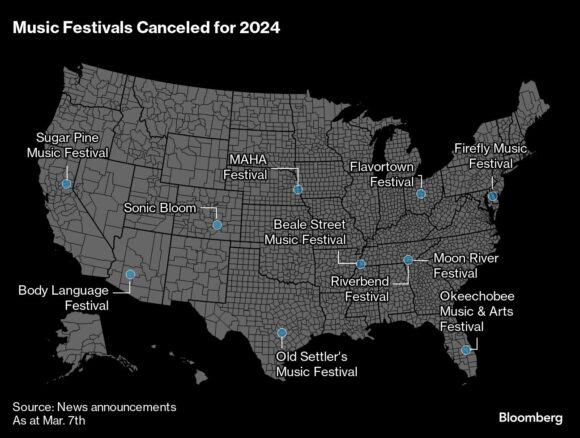For four decades, the Riverbend Festival delighted music fans in Tennessee with headlining acts like Lionel Ritchie and ZZ Top, but this year the show won’t go on.
“Riverbend is reevaluating and restructuring in order to be successful in the future,” the organizers said on their website.
After years of growth, some music festivals are in retreat. At least 10 shows in the US have been canceled this year, according to Bloomberg research. More budget-conscious consumers are a factor, but so are rising costs for staffing, stages and the performers.
“Everything’s more expensive, including the artists,” Cameron Collins, founder of festival organizer Brew Ha Ha Productions, said in an interview.
Tickets for April’s Coachella Valley Music and Arts Festival are still available for the second weekend after going on sale in January. Delaware’s Firefly Music Festival, which operated for 10 years featuring performers like Green Day and Dua Lipa, said on social media it is taking another year off and will return “when the timing is right.”
AEG Worldwide, which owns both festivals, declined to comment.
The troubles mirror what’s happening in other consumer businesses, from theme parks to casinos, and reflect tighter budgets after a surge in post-pandemic travel. The cost of going to a multiday music festival can top $1,000, including lodging and travel expenses, not to mention $15 beers.
“Concerts are basically the equivalent of a flight somewhere now when you’re paying $200 to $300 for a show,” said Connecticut-based concert fan Patrick Suter.
Festival promoters are taking steps to ease the burden. Music lovers can buy two-day tickets to the four days of the Bonnaroo festival in Tennessee, an option some are calling “half a roo.”
Beach Life Festival, being held in May in Redondo Beach, California, lowered general admission prices this year, and is including ticketing fees in that number, part of an industry shift toward all-in pricing. Cruel World, another rock festival a week later in nearby Pasadena, waived ticketing fees in a February promotion and still has general admission tickets available.
“They sort of start to cannibalize each other,” said Morgan Milardo, managing director of the Berklee Popular Music Institute in Boston. “It splits the market in half really.”
Among the other casualties this year: chef Guy Fieri’s Flavortown Music Festival in Columbus, Ohio, which was canceled before its debut, and the Okeechobee Music & Arts Festival in Florida, which is taking a pause. So too is the Beale Street Music Festival in Memphis, which saw attendance fall to its lowest level in three decades last year. The organizer attributed the decline to “economic challenges” and concerns about safety.
The tough environment means the organizers could consolidate as larger promoters look to expand into new markets.
“Our key executives are out there having those conversations on a daily basis,” said Chamie McCurry, chief marketing officer at festival production company Danny Wimmer Presents. The company runs seven festivals, including Kentucky’s Bourbon & Beyond, where country singer Zach Bryan is headlining and a general admission ticket costs $330.
After the Covid-19 pandemic, artists raised their fees to make up for lost income. Vendors are trying to recoup money they lost and pay off debt they incurred to stay afloat during the shutdown.
“Costs went up a lot in late ’21, ’22 into ’23, and we’re all applauding now, yes, most of those costs have stopped going up, but they still went up a lot,” Joe Berchtold, the chief financial officer of Live Nation Entertainment Inc., said at an investor conference this month.
The largest player in the concert business, Live Nation said ticket sales at its festivals in North America this year are pacing ahead of 2023. The Sea.Hear.Now Festival in Asbury Park, New Jersey, sold out minutes after tickets went on sale on March 7. Local hero Bruce Springsteen was a headliner.
“It’s common for a few events to fluctuate or fall off for a variety of reasons, so there’s always a few of those anecdotes,” Live Nation said in a statement. “But on a macro level the live music business is more robust than ever.”
Cities, meanwhile, are looking for a way to keep the festivals, which they see as a source of tourism revenue. After a feared cancellation earlier this year, Blues on the Green in Austin, Texas, will return thanks to a vote of support from the city council and a new sponsor.
Photo: Firefly Music Festival in Dover, Delaware, canceled plans for 2024. Photographer: Kevin Mazur/Getty Images for Firefly
Topics Trends
Was this article valuable?
Here are more articles you may enjoy.




 Judge Tosses Buffalo Wild Wings Lawsuit That Has ‘No Meat on Its Bones’
Judge Tosses Buffalo Wild Wings Lawsuit That Has ‘No Meat on Its Bones’  AI Claim Assistant Now Taking Auto Damage Claims Calls at Travelers
AI Claim Assistant Now Taking Auto Damage Claims Calls at Travelers  Former Broker, Co-Defendant Sentenced to 20 Years in Fraudulent ACA Sign-Ups
Former Broker, Co-Defendant Sentenced to 20 Years in Fraudulent ACA Sign-Ups  Insurify Starts App With ChatGPT to Allow Consumers to Shop for Insurance
Insurify Starts App With ChatGPT to Allow Consumers to Shop for Insurance 

